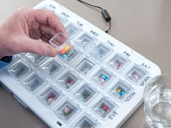Startling statistics from the National Academy of Sciences Institute of Medicine show that there are more than two million serious adverse drug events and about 100,000 deaths annually due to medication use problems.
Medication non-adherence is responsible for up to 69 percent of medication-related hospital admissions and 23 percent of nursing home admissions. Not only is this a health concern, but a financial one as well. The New England Healthcare Institute has estimated that $290 billion of healthcare expenditures could be avoided with improvements to medication adherence.
“Caregivers, doctors, hospitals and insurance companies all are very aware of the problem, especially among the older population and those with chronic illnesses, but the real issue is finding a solution that works,” says Eran Shavelsky, CEO of Medminder, headquartered in Newton, Mass.
The nonprofit Center for Technology and Aging reports that 41 percent of older adults take five or more medications each day. David Lindeman, director of the center, says: “More widespread use of technologies that reduce the cost and burden of medication-related illness among older adults is urgently needed.”
Smart Solutions Should Not Require Behavior Changes
 Shavelsky’s MedMinder (pictured left) has developed a product called Maya, what they call an intelligent pill organizer, designed to simplify medication management and improve adherence. “This system can be beneficial to people of any age, anyone who is taking multiple medications, several times each day.”
Shavelsky’s MedMinder (pictured left) has developed a product called Maya, what they call an intelligent pill organizer, designed to simplify medication management and improve adherence. “This system can be beneficial to people of any age, anyone who is taking multiple medications, several times each day.”
While at MIT’sSloan School of Management, Shavelsky first took note of the issue of medication compliance and the huge cost to the healthcare industry. During his research he did not find what he considered to be any effective existing technology solutions, and decided that there was a need for something simple and more affordable, that an older person would be comfortable with. In his quest he attracted the attention and support of Andrew Dibner, who was the co-founder of Lifeline Systems, the first personal response system, and Woodie Flowers, an award-winning engineering professor at MIT.
After talking with families, industry professionals and insurance companies about how people take medications, MedMinder developed a prototype system based on resulting criteria. “We wanted to build a solution that would not change behavior,” Shavelsky says. “People usually resist any change of routine, especially if it involves technology. And it was critical that we be able to collect adherence data for the caregivers and medical professionals involved in the patient’s care.”
The final Maya product was launched in May, 2009 and a number of organizations are testing the benefits for patient populations with chronic illnesses, including Harvard Pilgrim Health Care and Metropolitan Jewish Health System. Shavelsky tells us that patients are responding very favorably after trying the system.
“Within a week they report more of a feeling of control, greater confidence and peace of mind,” Shavelsky says. “And families and doctors find the data we provide to be very helpful in enabling interventions and support.”
The organizations report an adherence rate of higher than 90 percent with the use of Maya, which is significantly improved from the existing average of 55 to 60 percent.
Standalone Communications System and Pre-fill Option
The Maya system looks like a 7-day pillbox, with no digital readouts or buttons. But there is a built-in wireless cellular modem that communicates with the MedMinder central computer about the patient’s medication activity. The patient or the caregiver can configure the system on the Internet (or by phone if they have no computer access) to their particular notification and reporting preferences.
Maya has 28 compartments, or cups, that hold a week’s supply of medication and can accommodate dozens of different pills. When it is time for a person to take a medication the appropriate compartment flashes, and then beeps if there has been no response. According to the pre-set options, and it can also trigger an automatic phone call to the patient and/or caregiver, or send a text message or e-mail to the patient and/or caregiver. Caregivers can also access online records of the patient’s medication activity, or elect to receive ongoing text or e-mail notifications, or weekly reports that can be shared with any medical professionals involved in the care.
The patient or caregiver can refill the compartments themselves, or pre-filled trays can be provided directly by the pharmacist, reducing the chance of errors.
Shavelsky adds, “We believe technology is great to a point, but technology together with a dialogue with the patient is a much more complete solution.”
Maya is available with a monthly subscription through disease management programs of insurance companies, care management organizations, or directly at www.medminder.com or on Amazon.com.
Linda Kallman is a freelance writer/editor and communications consultant. To read more of her articles, please visit please visit her columnist page.
Edited by Michael Dinan